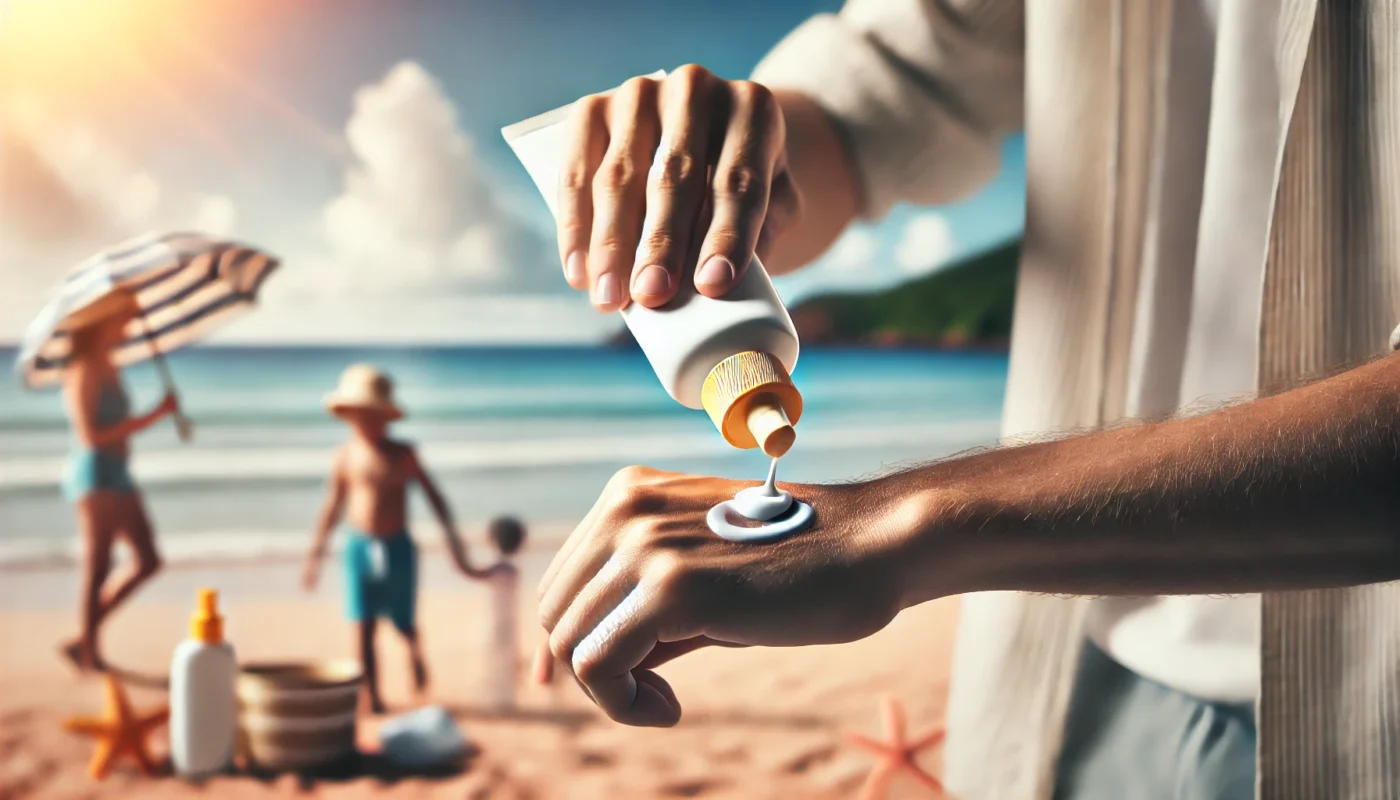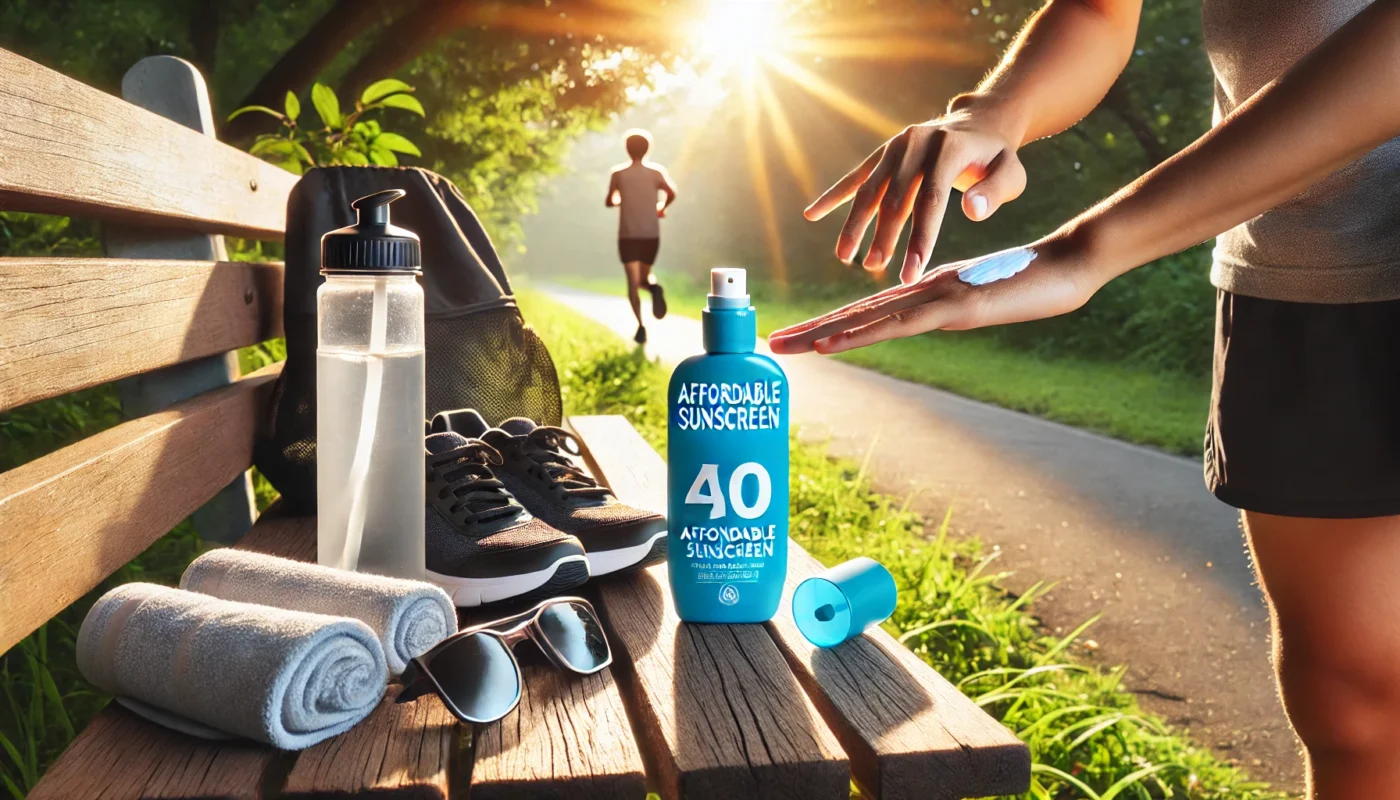Sun protection is a crucial part of maintaining healthy skin. Yet, finding a high-quality, affordable sunscreen can be a daunting task.
This guide aims to simplify the process. We’ll delve into the world of sunscreens, exploring the best budget-friendly options available.
Understanding the science behind sun protection is key. We’ll explain terms like SPF and broad-spectrum, helping you make informed choices.
We’ll also discuss the differences between chemical and physical sunscreens. This will help you identify the best type for your skin and lifestyle.
Our focus will be on drugstore sunblocks. These products often offer the same protection as pricier counterparts, without the hefty price tag.
We’ll provide recommendations for various skin types. Whether you have sensitive skin or need a face-specific sunscreen, we’ve got you covered.
Finally, we’ll offer practical tips on how to incorporate sun protection into your daily routine.
By the end of this guide, you’ll be well-equipped to choose a sunscreen that suits your needs and budget. Let’s dive in and explore the top affordable sunscreens for every budget.
You may also like: Essential Summer Skin Care Tips
Understanding Sun Protection: SPF and Broad-Spectrum Explained
Sun protection begins with understanding SPF and broad-spectrum. SPF, or Sun Protection Factor, measures sunscreen’s ability to block UVB rays. These rays cause sunburn and contribute to skin cancer.
Knowing about broad-spectrum protection is also crucial. This term means that the product shields against both UVA and UVB rays. UVA rays penetrate deeply, causing premature aging and increased cancer risk.
Here’s a quick list to help:
- SPF 15: Blocks 93% of UVB rays.
- SPF 30: Blocks 97% of UVB rays.
- SPF 50: Blocks 98% of UVB rays.
Choosing a sunscreen with broad-spectrum protection and an adequate SPF can significantly reduce skin damage. For daily use, dermatologists recommend using at least SPF 30. This ensures sufficient protection in most conditions. Understanding these basics makes selecting the right sunblock easier, enhancing your skincare routine effectively.
Chemical vs. Physical Sunscreens: What’s Best for You?
When choosing a sunscreen, you must decide between chemical and physical types. Chemical sunscreens absorb UV rays through ingredients like avobenzone and octocrylene. These ingredients create a chemical reaction, converting UV rays into heat, which is then released from the skin.
On the other hand, physical sunscreens contain minerals like zinc oxide and titanium dioxide. These ingredients act as a barrier, reflecting UV rays away from the skin. They’re often less irritating and ideal for sensitive skin types.
Your choice depends on personal needs and preferences. For active individuals, chemical sunscreens might feel lighter and work well with sweat. Meanwhile, physical sunscreens are suitable for those with sensitive or acne-prone skin, offering soothing sun protection. Identifying the right type can enhance your routine, ensuring comfort and safety under the sun.
How to Read Sunscreen Labels: Decoding Ingredients
Understanding sunscreen labels can be overwhelming but crucial for skin health. First, focus on the SPF number, which indicates protection level against UVB rays. Higher SPF offers more sunburn defense, but no sunscreen blocks all UV rays entirely.
Also, look for the term “broad-spectrum,” which ensures defense against both UVA and UVB rays. UVA rays are known for aging the skin, while UVB rays cause burning. Broad-spectrum coverage is crucial to reduce skin cancer risk.
Additionally, knowing the active ingredients can guide you in choosing the right product:
- Zinc Oxide/Titanium Dioxide: Common in physical sunscreens, effective blockers.
- Avobenzone: A chemical filter offering broad-spectrum protection.
- Oxybenzone: Effective but may cause allergic reactions in sensitive skins.
Reading labels helps choose a sunscreen best suited for your skin type and lifestyle. This knowledge can empower a more informed and protective approach to sun safety.
The Best Drugstore Sunblocks for Every Skin Type
Finding the best drugstore sunblock can be daunting with the myriad of choices available. However, there are excellent options for various skin types without compromising on protection. Drugstore sunscreens combine affordability with effectiveness, making them accessible to everyone.
Skin type plays a pivotal role in sunscreen selection. Individuals with oily skin might prefer a mattifying formula to reduce shine. Conversely, those with dry skin should look for added moisturizers to nourish and protect.
For those seeking a lightweight feel, a gel-based sunscreen can deliver without feeling heavy. Many drugstore sunscreens also offer broad-spectrum protection, ensuring defense against both UVA and UVB rays.
Here are some recommendations for different skin types:
- Oily Skin: Choose sunscreens with a matte finish to control shine.
- Dry Skin: Opt for products with hydrating ingredients like hyaluronic acid.
- Sensitive Skin: Look for formulations labeled “fragrance-free” or “hypoallergenic.”
- Combination Skin: Consider a light lotion that doesn’t clog pores but hydrates dry areas.
The right sunscreen can protect and enhance your skin’s natural beauty. Exploring drugstore options allows you to find affordable and high-quality products.

Best Cheap Face Sunscreen
Finding a cheap face sunscreen that performs well can transform your skincare routine without hurting your wallet. Lightweight formulations that easily absorb are ideal for the face. Many offer additional benefits like mattifying properties or hydration.
A popular choice is a sunscreen with a non-greasy texture that leaves no white cast. This type caters especially well to those with oily or combination skin. Furthermore, sunscreens with added antioxidants can offer extra skincare benefits, protecting against pollutants.
When selecting, prioritize those that include “non-comedogenic” on the label. This ensures the product won’t clog pores, leading to clearer skin. Drugstore face sunscreens are versatile, making them suitable for daily use, allowing seamless inclusion in regular skincare routines.
Best Drugstore Sunscreen for Sensitive Skin
Sensitive skin requires more thoughtful selection, demanding gentle, soothing formulations. Sunscreens without fragrances or harsh chemicals reduce irritation risks. Mineral-based options are often recommended for their gentleness and effective barrier protection.
Many drugstore sunscreens cater specifically to sensitive skin, leveraging calming ingredients like aloe or chamomile. Such components help soothe while providing adequate sun protection. The key is avoiding potential irritants such as dyes or parabens.
Consider also the texture when choosing for sensitive skin. Lightweight, easily spreadable creams or lotions minimize skin tugging during application. By selecting the right product, sensitive skin can be shielded from harmful rays without adverse reactions.
Best Value Sunscreen for Body
When it comes to full-body coverage, balance between protection and affordability is essential. Drugstore sunscreens excel in offering large quantities at reasonable prices, ensuring you won’t hesitate to apply liberally. Opt for options marketed as “water-resistant” for longer-lasting protection during outdoor activities.
Spray formulations are favored for their ease of application, especially on hard-to-reach areas. Additionally, lotions with added moisturizers can benefit those with dry skin, offering dual benefits of hydration and sun defense.
Selecting a broad-spectrum option helps to guard against both UVA aging rays and UVB burning rays. With affordable choices, there’s no excuse to skimp on application, allowing for comprehensive coverage and peace of mind in sun exposure.
Application Tips for Maximum Sun Protection
Proper sunscreen application is critical to its effectiveness. For full protection, apply sunscreen generously and evenly on all exposed skin. Remember, missing spots can lead to uneven protection and sunburn.
Begin by using a sufficient quantity. Most adults need about a shot glass full for the body. For the face alone, a nickel-sized dollop is often recommended. Applying too little reduces the effectiveness of the SPF.
To maximize benefits, apply sunscreen 15 to 30 minutes before sun exposure. This allows the product to properly bind to your skin. Reapply every two hours, or immediately after swimming or sweating.
Consider these application tips for optimal results:
- Remember Ears, Neck, and Feet: Commonly missed but important areas.
- Don’t Forget Your Lips: Use an SPF lip balm for protection.
- Layer if Needed: Combine face and body sunscreens for better coverage.
By incorporating these practices, you’ll strengthen your defense against the sun’s harmful effects and help maintain healthy skin.
Water Resistance and Active Lifestyles: Keeping Protected on the Move
For those with active lifestyles, choosing a water-resistant sunscreen is crucial. Whether you’re swimming, running, or simply sweating, your sunscreen should stay effective. Look for products labeled as “water-resistant” or “very water-resistant” for reliable protection.
Water-resistant sunscreens are designed to stay on the skin longer, even when wet. However, they are not completely water-proof. Always reapply after 40 to 80 minutes of swimming or sweating, as directed on the packaging. This ensures continued protection against harmful UV rays.

Incorporating sunscreen into your active routine shouldn’t be a hassle. Opt for lightweight, non-greasy formulas that won’t clog pores. Products in stick or spray form can offer convenient application and are easy to carry on-the-go. Remember, proper sunscreen use is just as vital when you’re active as it is during regular outdoor activities. This small step ensures your skin stays safe, regardless of your schedule.
The Environmental Impact of Sunscreen: Making Eco-Friendly Choices
Choosing an environmentally-friendly sunscreen helps protect marine ecosystems while safeguarding your skin. Many conventional sunscreens contain ingredients like oxybenzone and octinoxate, which can harm coral reefs. These chemicals can contribute to coral bleaching and negatively impact sea life.
Fortunately, there are eco-friendly alternatives available. Look for sunscreens labeled as “reef-safe” or those that use non-nano zinc oxide or titanium dioxide. These minerals provide effective protection without posing a risk to underwater environments. Moreover, opting for biodegradable sunscreens ensures that the product breaks down naturally, reducing its ecological footprint.
To make informed choices, consider the following when selecting eco-friendly sunscreens:
- Ingredients: Avoid oxybenzone and octinoxate.
- Label Claims: Look for “reef-safe” or biodegradable products.
- Formulation: Choose non-nano mineral-based options.
Being mindful of the environmental impact of your sun protection choices contributes to a healthier planet. Selecting eco-friendly sunscreens allows you to enjoy the great outdoors responsibly, with peace of mind about your ecological footprint.
Incorporating Sunscreen into Your Daily Routine
Integrating sunscreen into your daily routine is crucial for long-term skin health. Consistent use prevents sun damage, which can lead to premature aging and skin cancer. Begin by selecting a sunscreen that fits seamlessly into your skincare regimen, ensuring it’s a product you enjoy using every day.
Consider applying sunscreen as the final step in your morning routine. After cleansing and moisturizing, use a broad-spectrum sunscreen with at least SPF 30. This routine creates a protective barrier against harmful UV rays.
Here are some strategies to make sunscreen a daily habit:
- Place sunscreen in your bathroom: Keep it visible as a reminder.
- Use multitasking products: Try moisturizers with added SPF.
- Set an alarm: Time daily application reminders on your phone.
By embedding sun protection into your daily habits, you set a strong foundation for lifelong skin health. These small changes can significantly enhance your defense against sun damage, ensuring that your skin remains healthy and radiant.
Affordable Sunscreen Without Compromise: Balancing Price and Quality
Finding an affordable sunscreen doesn’t mean sacrificing quality. Numerous drugstore options offer excellent protection without a high price tag. It’s about knowing what to look for in a sunscreen that provides both value and effectiveness.
When evaluating sunscreens, prioritize those with broad-spectrum protection to guard against UVA and UVB rays. Look for a minimum SPF of 30, ensuring it aligns with dermatological recommendations. The best cheap sunblock protects without irritating the skin or leaving a heavy residue.
Consider the product’s ingredient list and texture. Affordable doesn’t mean it can’t include quality ingredients like zinc oxide or titanium dioxide for mineral protection. Additionally, ensure the sunscreen’s texture suits your preference, whether you’re looking for a lightweight lotion or a moisturizing cream.
Investing in a cost-effective sunscreen can contribute significantly to your skincare routine. With careful selection, you can maintain your skin’s health without overspending, proving that effective sun protection is accessible to everyone.
The Role of Sunscreen in Holistic Health and Wellness
Sunscreen plays an integral role in a holistic approach to health. It is not just about preventing sunburns; it’s a critical step in preventing skin cancer. Consistent use can protect against harmful UV rays, which contribute to both aging and severe health conditions.
Beyond its physical benefits, sunscreen contributes to your mental and emotional wellness. By maintaining healthy skin, you’re enhancing your self-confidence and overall outlook. Knowing you’re actively protecting yourself from external harm can reduce anxiety related to outdoor activities.
Incorporating sunscreen into your daily routine aligns with a broader wellness strategy. It’s a simple step that complements nutrition, exercise, and mental wellness practices. As part of a lifestyle that values health and balance, sunscreen serves as a protective shield, enhancing your quality of life at every sunlit moment.
Expert Recommendations: Dermatologist-Approved Budget Sunscreens
Dermatologists recommend sunscreens that balance quality with affordability. Many affordable options on the market are just as effective as their high-end counterparts. The key is to choose products with reliable ingredients and broad-spectrum protection.
Experts emphasize the importance of using sunscreens that suit your skin type. Whether you have oily, dry, or sensitive skin, there’s a budget-friendly option available. This ensures both protection and comfort, encouraging consistent use.
Here’s a list of dermatologist-approved budget sunscreens worth considering:
- Neutrogena Ultra Sheer Dry-Touch Sunscreen SPF 55: Ideal for daily wear, offering a non-greasy finish.
- CeraVe Hydrating Mineral Sunscreen SPF 30: Great for sensitive skin, containing skin-loving ceramides.
- La Roche-Posay Anthelios Melt-in Milk Sunscreen SPF 60: Provides broad-spectrum protection and a smooth application.
- Banana Boat Ultra Sport Sunscreen Lotion SPF 50: Perfect for outdoor activities with water-resistant properties.
- Aveeno Positively Mineral Sensitive Skin Sunscreen SPF 50: Contains pure oat essence for soothing protection.
These options provide robust defense without a hefty price tag, making sun safety accessible to all.
Conclusion: Protecting Your Skin Without Breaking the Bank
Affordable sunscreens can effectively guard your skin against harmful rays. You don’t need to spend a fortune to get great protection.

Choosing the right product ensures your skin stays healthy and vibrant. Prioritize sun safety and incorporate these budget-friendly options into your routine. This smart approach helps prevent damage while keeping costs low.
Further Reading
Elle: The 15 Best Drugstore Sunscreens for Protection on a Budget
Business Insider: I put Trader Joe’s $9 and Supergoop’s $38 ‘invisible’ sunscreen to the test, and I’ve already bought another bottle of the dupe
Glamour: 15 Best Face Sunscreens, Recommended by Dermatologists and Glamour Editors
best drugstore sunscreen, affordable sunscreen, cheap sunscreen, drugstore sunblock, sunscreen for sensitive skin, best cheap face sunscreen, broad-spectrum protection, SPF, lightweight sunscreen, eco-friendly sunscreen, dermatologist-approved, skincare routine, drugstore face sunscreen, sunscreen application tips, affordable lightweight sunscreen, sun protection.
Important Note: The information contained in this article is for general informational purposes only, and should not be construed as health or medical advice, nor is it intended to diagnose, prevent, treat, or cure any disease or health condition. Before embarking on any diet, fitness regimen, or program of nutritional supplementation, it is advisable to consult your healthcare professional in order to determine its safety and probable efficacy in terms of your individual state of health.
Regarding Nutritional Supplements Or Other Non-Prescription Health Products: If any nutritional supplements or other non-prescription health products are mentioned in the foregoing article, any claims or statements made about them have not been evaluated by the U.S. Food and Drug Administration, and such nutritional supplements or other health products are not intended to diagnose, treat, cure, or prevent any disease.

